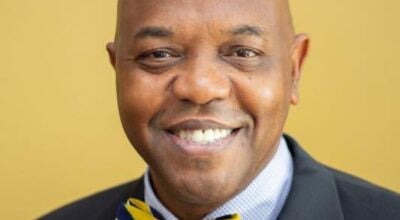Bowman welcomes VIPs
Published 8:14 pm Wednesday, January 18, 2012

Odessa Taylor learns how new voting equipment can help those with impaired vision view ballots. -- Rick Couch
A packed house at the Carl C. Morgan Convention Center welcomed representatives of numerous low-vision professionals during the Visually Impaired People Organization of Selma Inc.’s annual conference.
A number of new machines designed to increase the independence of people with low vision were on display, and screenings were also conducted to catch minor issues before they could become bigger problems.
The large crowd, VIP president William Bowman said, was very encouraging.
“I’ve been very excited about all the different counties that were represented and all the volunteers who came out to help,” he said. “It’s been a great turnout. We are excited to have all of the technology on hand to let people know what is out there to help them.”
Several guest speakers were on hand to discuss services that are available. Another speaker, Selma University student Catresa Crews, also discussed some of the stigma’s associated with visually impaired people.
Growing up, Crews said socializing was difficult for her.
“People had to be patient and help me out,” she said. “I had to hold onto them and keep up with them. It was hard to have a normal social life. Normal is different for a blind person. Our life revolves around being able to touch, smell and hear.”
Many things sighted people take for granted are challenges for a person who cannot see, Crews said.
“When a person is blind, they are not able to look at photos or see what is on the movie screen, or recognize a person waving at you in the park,” she said.
One of the biggest challenges for a visually impaired person is reading people, Crews said. This also limits social activity at an early age and slows social development.
“A person that is blind matures slowly because it is hard for them to visually imitate the things sighted people do like dancing,” she said. “It’s hard for us to observe nonverbal cues and see if people are joking by their facial expressions. Normal things sighted people pick up can be difficult.”
There are several different attitudes people take toward the visually impaired that can cause problems, Crews said. People often do things for blind people and speak up for them because they see blindness as a weakness. Others avoid them because they fear what they don’t understand. There is another group that talks down to the visually impaired and make fun of them.
On the other end of the spectrum, Crews said those with impaired vision can take on equally damaging attitudes. Some blind people also insist they don’t need any help, which can get them in trouble. Others become completely dependent on others and lack confidence.
Socializing is so important for the visually impaired, Crews said, because it allows them to become more independent and eliminate stereotypes.
“As blind people, we do have a voice,” she said. “We expect you sighted people to have an ear. It is up to you to hear what we are saying and become educated.”






